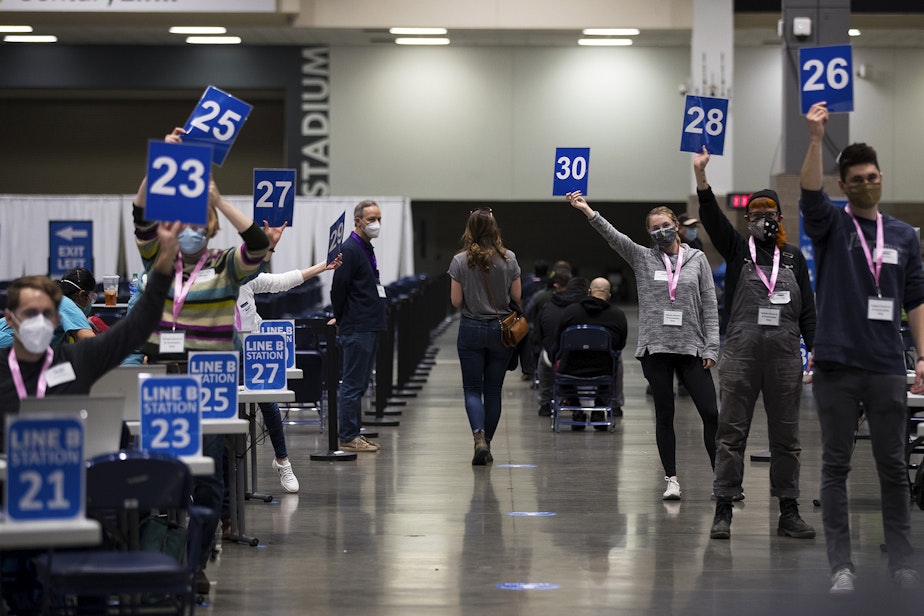Vaccination eligibility will soon expand big time. Will Washington state have a supply issue?

More than 2.8 million Covid-19 vaccine doses have been given in Washington state, so far. Starting next Wednesday, many more people will become eligible for a vaccine. But will there be enough doses available?
KUOW’s Eilis O’Neill has been covering the vaccine rollout here in Washington. She gave Kim Malcolm this update.
This interview has been edited for clarity.
Kim Malcolm: Let's just start with who is eligible right now for a vaccine?
Eilis O’Neill: Right now, some essential workers, such as people who work in grocery stores and public transit are eligible, as well as people who are pregnant, people who have certain disabilities, plus everyone from all the previous tiers like people 65 and older and healthcare workers and teachers.
There is a difference between being eligible to get a shot and then actually getting that appointment. Are the folks who are eligible right now able to get their appointments?
People I've talked to who are trying right now are finding appointments, especially compared to early on when it was almost impossible to find one. Statewide, about two-thirds of the people currently eligible for the vaccine have gotten at least their first shot.
Sponsored
On Wednesday, March 31, more groups of people will become eligible. Who are they?
An enormous group of people becomes eligible. Anyone 60 or older, people who work in restaurants, construction, and manufacturing, and anyone 16 or older with two or more underlying conditions. These are really common conditions, things like diabetes, being overweight, having high blood pressure, a long list of various conditions that would put you at risk of severe Covid if you contracted the disease.
This group is about 1.5 million people statewide. Just for context, there are about 3 million people currently eligible. So, half again as many people are going to become eligible, all on one day.
Which begs the question, is there going to be enough vaccine for everybody who wants one?
Not for everyone right away. For example, next week, Washington is only getting about 200,000 first doses. That's only enough for one in eight of the people becoming eligible next week.
Sponsored
That said, over the next couple of weeks supply is supposed to really increase. If Washington gets the doses it's supposed to get in April, most of the people who are becoming eligible next week should be able to get their first shot by the end of next month.
Let's talk about May 1, which is a date quite a few of us are waiting for. This is when state officials have said that every adult will be eligible. That follows a directive from President Biden for the states to open up eligibility to everyone at that point. Here in Washington, how many more people are we talking about being eligible then?
It depends on whether the Washington Department of Health decides to do an intermediate tier and open vaccines up to another group of people sometime in mid-April, which they might do. If they don't, that group is only about 1.5 million people. It's only about the size of the group that's becoming eligible this coming week.
We’ve all heard the stories about people just spending hours online trying to find an appointment. Do you have any tips for people who are looking to get their appointment and move on?
Some providers allow people to make their appointments ahead of time. If you are not eligible now, but becoming eligible on Wednesday, you can actually start looking for an appointment as long as it's for a date after you become eligible.
Sponsored
So you can actually try to work ahead of the game. How about those folks who don't have great access to the internet, or are just not fluent in bureaucratic ways? How are they going to be served?
That's still a big issue in the state, with some groups of people getting vaccinated at much higher rates than others. Activists and organizers who serve communities who maybe don't speak English or don't have a computer or don't have a car to get to a vaccination appointment are trying to get the state to partner with community groups to bring vaccines to people where they are — churches or community centers — to make sure that everyone has access to the vaccine. That's going to be an ongoing issue into the summer.
Listen to the interview by clicking the play button above.





